- Home
- Brandon Sanderson
Warbreaker Page 2
Warbreaker Read online
Page 2
Page 2
“So,” Vahr croaked, “you judge me, just like everyone else. ”
“Your failed rebellion is not my concern. I just want your Breath. ”
“You and the entire Hallandren court. ”
“Yes. But you’re not going to give it to one of the Returned. You’re going to give it to me. In exchange for killing you. ”
“Doesn’t seem like much of a trade. ” There was a hardness—a void of emotion—in Vahr that Vasher had not seen the last time they had parted, years before.
Odd, Vasher thought, that I should finally, after all of this time, find something in the man that I can identify with.
Vasher kept a wary distance from Vahr. Now that the man’s voice was free, he could Command. However, he was touching nothing except for the metal chains, and metal was very difficult to Awaken. It had never been alive, and it was far from the form of a man. Even during the height of his power, Vasher himself had only managed to Awaken metal on a few, select occasions. Of course, some extremely powerful Awakeners could bring objects to life that they weren’t touching, but that were in the sound of their voice. That, however, required the Ninth Heightening. Even Vahr didn’t have that much Breath. In fact, Vasher knew of only one living person who did: the God King himself.
That meant Vasher was probably safe. Vahr contained a great wealth of Breath, but had nothing to Awaken. Vasher walked around the chained man, finding it very difficult to offer any sympathy. Vahr had earned his fate. Yet the priests would not let him die while he held so much Breath; if he died, it would be wasted. Gone. Irretrievable.
Not even the government of Hallandren—which had such strict laws about the buying and passing of Breath—could let such a treasure slip away. They wanted it badly enough to forestall the execution of even a high-profile criminal like Vahr. In retrospect, they would curse themselves for not leaving him better guarded.
But, then, Vasher had been waiting two years for an opportunity like this one.
“Well?” Vahr asked.
“Give me the Breath, Vahr,” Vasher said, stepping forward.
Vahr snorted. “I doubt you have the skill of the God King’s torturers, Vasher—and I’ve withstood them for two weeks now. ”
“You’d be surprised. But that doesn’t matter. You are going to give me your Breath. You know you have only two choices. Give it to me, or give it to them. ”
Vahr hung by his wrists, rotating slowly. Silent.
“You don’t have much time to consider,” Vasher said. “Any moment now, someone is going to discover the dead guards outside. The alarm will be raised. I’ll leave you, you will be tortured again, and you will eventually break. Then all the power you’ve gathered will go to the very people you vowed to destroy. ”
Vahr stared at the floor. Vasher let him hang for a few moments, and could see that the reality of the situation was clear to him. Finally, Vahr looked up at Vasher. “That . . . thing you bear. It’s here, in the city?”
Vasher nodded.
“The screams I heard earlier? It caused them?”
Vasher nodded again.
“How long will you be in T’Telir?”
“For a time. A year, perhaps. ”
“Will you use it against them?”
“My goals are my own to know, Vahr. Will you take my deal or not? Quick death in exchange for those Breaths. I promise you this. Your enemies will not have them. ”
Vahr grew quiet. “It’s yours,” he finally whispered.
Vasher reached over, resting his hand on Vahr’s forehead—careful not to let any part of his clothing touch the man’s skin, lest Vahr draw forth color for Awakening.
Vahr didn’t move. He looked numb. Then, just as Vasher began to worry that the prisoner had changed his mind, Vahr Breathed. The color drained from him. The beautiful Iridescence, the aura that had made him look majestic despite his wounds and chains. It flowed from his mouth, hanging in the air, shimmering like mist. Vasher drew it in, closing his eyes.
“My life to yours,” Vahr Commanded, a hint of despair in his voice. “My Breath become yours. ”
The Breath flooded into Vasher, and everything became vibrant. His brown cloak now seemed deep and rich in color. The blood on the floor was intensely red, as if aflame. Even Vahr’s skin seemed a masterpiece of color, the surface marked by deep black hairs, blue bruises, and sharp red cuts. It had been years since Vasher had felt such . . . life.
He gasped, falling to his knees as it overwhelmed him, and he had to drop a hand to the stone floor to keep himself from toppling over. How did I live without this?
He knew that his senses hadn’t actually improved, yet he felt so much more alert. More aware of the beauty of sensation. When he touched the stone floor, he marveled at its roughness. And the sound of wind passing through the thin dungeon window up above. Had it always been that melodic? How could he not have noticed?
“Keep your part of the bargain,” Vahr said. Vasher noted the tones in his voice, the beauty of each one, how close they were to harmonics. Vasher had gained perfect pitch. A gift for anyone who reached the Second Heightening. It would be good to have that again.
Vasher could, of course, have up to the Fifth Heightening at any time, if he wished. That would require certain sacrifices he wasn’t willing to make. And so he forced himself to do it the old-fashioned way, by gathering Breaths from people like Vahr.
Vasher stood, then pulled out the colorless scarf he had used earlier. He tossed it over Vahr’s shoulder, then Breathed.
He didn’t bother making the scarf have human shape, didn’t need to use a bit of his hair or skin for a focus—though he did have to draw the color from his shirt.
Vasher met Vahr’s resigned eyes.
“Strangle things,” Vasher Commanded, fingers touching the quivering scarf.
It twisted immediately, pulling away a large—yet now inconsequential—amount of Breath. The scarf quickly wrapped around Vahr’s neck, tightening, choking him. Vahr didn’t struggle or gasp, he simply watched Vasher with hatred until his eyes bulged and he died.
Hatred. Vasher had known enough of that in his time. He quietly reached up and recovered his Breath from the scarf, then left Vahr dangling in his cell. Vasher passed quietly though the prison, marveling at the color of the woods and the stones. After a few moments of walking, he noticed a new color in the hallway. Red.
He stepped around the pool of blood—which was seeping down the inclined dungeon floor—and moved into the guard room. The three guards lay dead. One of them sat in a chair. Nightblood, still mostly sheathed, had been rammed through the man’s chest. About an inch of a dark black blade was visible beneath the silver sheath.
Vasher carefully slid the weapon fully back into its sheath. He did up the clasp.
I did very well today, a voice said in his mind.
Vasher didn’t respond to the sword.
I killed them all, Nightblood continued. Aren’t you proud of me?
Vasher picked up the weapon, accustomed to its unusual weight, and carried it in one hand. He recovered his duffel and slung it over his shoulder.
I knew you’d be impressed, Nightblood said, sounding satisfied.
1
There were great advantages to being unimportant.
True, by many people’s standards, Siri wasn’t “unimportant. ” She was, after all, the daughter of a king. Fortunately, her father had four living children, and Siri—at seventeen years of age—was the youngest. Fafen, the daughter just older than Siri, had done the family duty and become a monk. Above Fafen was Ridger, the eldest son. He would inherit the throne.
And then there was Vivenna. Siri sighed as she walked down the path back to the city. Vivenna, the firstborn, was . . . well . . . Vivenna. Beautiful, poised, perfect in most every way. It was a good thing, too, considering the fact that she was betrothed to a god. Either way, Siri—as fourth child—was redundant. Vivenna and Ridger had to focus on their studies; Fafen had
to do her work in the pastures and homes. Siri, however, could get away with being unimportant. That meant she could disappear into the wilderness for hours at a time.
People would notice, of course, and she would get into trouble. Yet even her father would have to admit that her disappearance hadn’t caused much inconvenience. The city got along just fine without Siri—in fact, it tended to do a little better when she wasn’t around.
Unimportance. To another, it might have been offensive. To Siri it was a blessing.
She smiled, walking into the city proper. She drew the inevitable stares. While Bevalis was technically the capital of Idris, it wasn’t that big, and everyone knew her by sight. Judging by the stories Siri had heard from passing ramblemen, her home was hardly even a village compared with the massive metropolises in other nations.
She liked it the way it was, even with the muddy streets, the thatched cottages, and the boring—yet sturdy—stone walls. Women chasing runaway geese, men pulling donkeys laden with spring seed, and children leading sheep on their way to pasture. A grand city in Xaka, Hudres, or even terrible Hallandren might have exotic sights, but it would be crowded with faceless, shouting, jostling crowds, and haughty noblemen. Not Siri’s preference; she generally found even Bevalis to be a bit busy for her.
Still, she thought, looking down at her utilitarian grey dress, I’ll bet those cities have more colors. That’s something I might like to see.
Her hair wouldn’t stand out so much there. As usual, the long locks had gone blond with joy while she’d been out in the fields. She concentrated, trying to rein them in, but she was only able to bring the color to a dull brown. As soon as she stopped focusing, her hair just went back to the way it had been. She’d never been very good at controlling it. Not like Vivenna.
As she continued through the town, a group of small figures began trailing her. She smiled, pretending to ignore the children until one of them was brave enough to run forward and tug on her dress. Then she turned, smiling. They regarded her with solemn faces. Idris children were trained even at this age to avoid shameful outbursts of emotion. Austrin teachings said there was nothing wrong with feelings, but drawing attention to yourself with them was wrong.
Siri had never been very devout. It wasn’t her fault, she reasoned, if Austre had made her with a distinct inability to obey. The children waited patiently until Siri reached into her apron and pulled out a couple of brightly colored flowers. The children’s eyes opened wide, gazing at the vibrant colors. Three of the flowers were blue, one yellow.
The flowers stood out starkly against the town’s determined drabness. Other than what one could find in the skin and eyes of the people, there wasn’t a drop of color in sight. Stones had been whitewashed, clothing bleached grey or tan. All to keep the color away.
For without color, there could be no Awakeners.
The girl who had tugged Siri’s skirt finally took the flowers in one hand and dashed away with them, the other children following behind. Siri caught a look of disproval in the eyes of several passing villagers. None of them confronted her, though. Being a princess—even an unimportant one—did have its perks.

 Steelheart
Steelheart The Rithmatist
The Rithmatist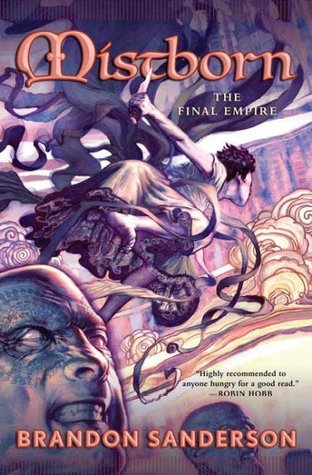 Mistborn: The Final Empire
Mistborn: The Final Empire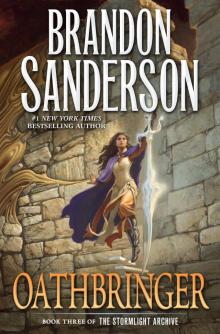 Oathbringer
Oathbringer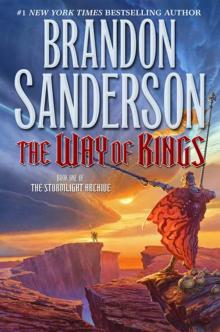 The Way of Kings
The Way of Kings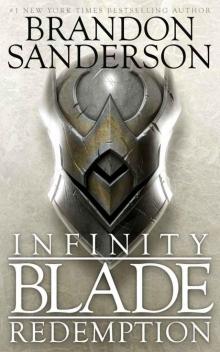 Redemption
Redemption Skin Deep
Skin Deep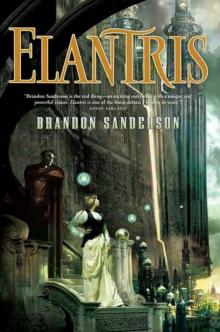 Elantris
Elantris Snapshot
Snapshot Sixth of the Dusk (Cosmere)
Sixth of the Dusk (Cosmere)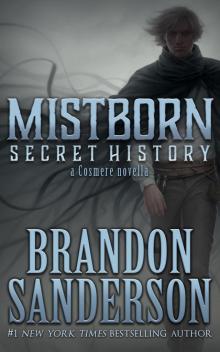 Mistborn: Secret History
Mistborn: Secret History White Sand, Volume 1
White Sand, Volume 1 Legion
Legion The Well of Ascension
The Well of Ascension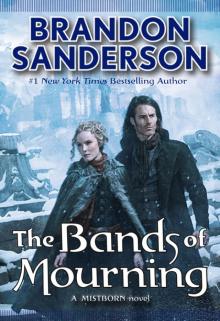 The Bands of Mourning
The Bands of Mourning Words of Radiance
Words of Radiance The Hero of Ages
The Hero of Ages Calamity
Calamity Alcatraz Versus the Scrivener's Bones
Alcatraz Versus the Scrivener's Bones The Alloy of Law
The Alloy of Law The Emperors Soul
The Emperors Soul The Dark Talent
The Dark Talent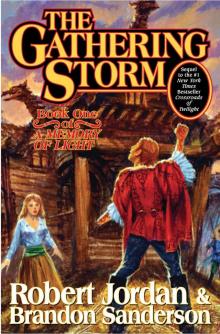 The Gathering Storm
The Gathering Storm Alcatraz Versus the Shattered Lens
Alcatraz Versus the Shattered Lens Mitosis
Mitosis Alcatraz vs. The Evil Librarians
Alcatraz vs. The Evil Librarians Rhythm of War (9781429952040)
Rhythm of War (9781429952040)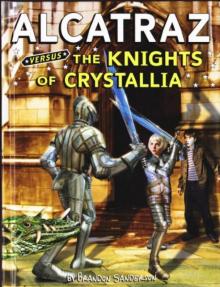 Alcatraz Versus the Knights of Crystallia
Alcatraz Versus the Knights of Crystallia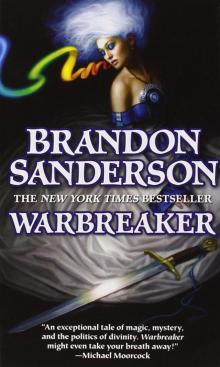 Warbreaker
Warbreaker Firstborn
Firstborn Starsight
Starsight Edgedancer
Edgedancer Perfect State
Perfect State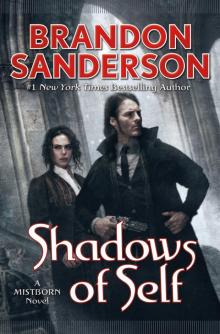 Shadows of Self
Shadows of Self The Way of Kings Prime
The Way of Kings Prime Starsight (US)
Starsight (US) Shadows for Silence in the Forests of Hell
Shadows for Silence in the Forests of Hell Arcanum Unbounded: The Cosmere Collection
Arcanum Unbounded: The Cosmere Collection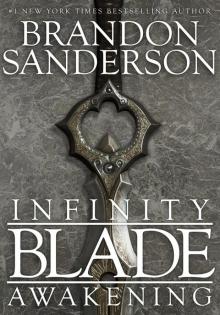 Awakening
Awakening Firefight
Firefight Dawnshard
Dawnshard Defending Elysium
Defending Elysium White Sand
White Sand Infinity Blade: Redemption
Infinity Blade: Redemption The Final Empire
The Final Empire Skyward
Skyward Lies of the Beholder
Lies of the Beholder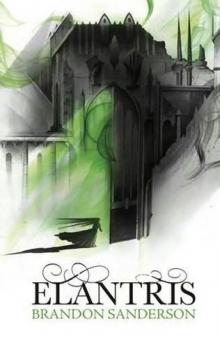 Elantris e-1
Elantris e-1 Steelheart r-1
Steelheart r-1 Legion: Skin Deep
Legion: Skin Deep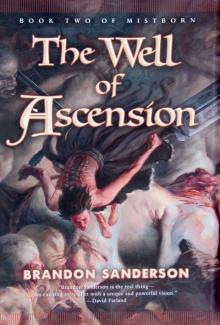 Well of Ascension
Well of Ascension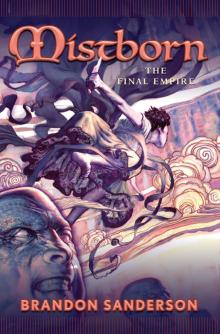 Mistborn
Mistborn Alcatraz versus the Evil Librarians
Alcatraz versus the Evil Librarians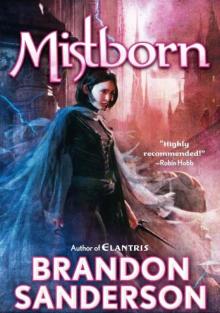 The Final Empire m-1
The Final Empire m-1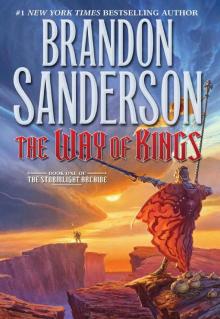 The Way of Kings (Stormlight Archive, The)
The Way of Kings (Stormlight Archive, The) Calamity (The Reckoners)
Calamity (The Reckoners) Legion and the Emperor's Soul
Legion and the Emperor's Soul Legion: The Many Lives of Stephen Leeds
Legion: The Many Lives of Stephen Leeds The Mistborn Trilogy
The Mistborn Trilogy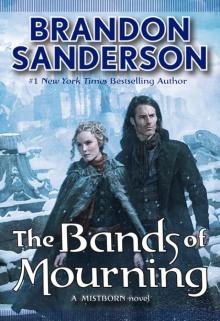 Bands of Mourning
Bands of Mourning Alcatraz
Alcatraz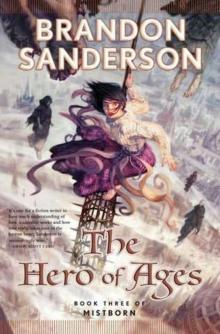 The Hero of Ages m-3
The Hero of Ages m-3 Alcatraz vs. the Shattered Lens
Alcatraz vs. the Shattered Lens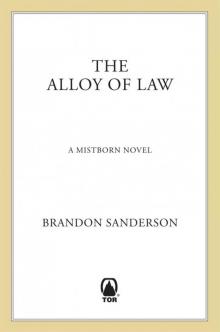 The Alloy of Law: A Mistborn Novel
The Alloy of Law: A Mistborn Novel The Way of Kings sa-1
The Way of Kings sa-1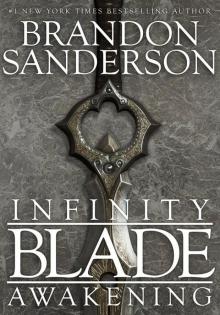 Infinity Blade: Awakening
Infinity Blade: Awakening Sixth of the Dusk
Sixth of the Dusk The Stormlight Archive
The Stormlight Archive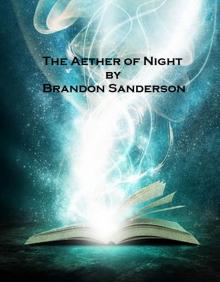 The Aether of Night
The Aether of Night